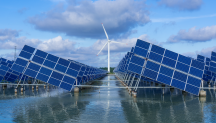

IRENA’s Year in Review 2018
Newsletter
A run-through of highlights from IRENA during the year
The last 12 months have been a remarkable time for renewable energy. The cost of renewables has continued to plummet, capacity expansion has accelerated, and a sense of urgency to address climate change through a renewable-powered global energy transition, has grown.
With the end of the year upon us, IRENA has taken a moment to reflect on the year's activities and accomplishments. We've done this in the past, and in case you're interested here's what happened in 2017.
Jump to: January, February, March, April, May, June, July, August, September, October, November, December.
January
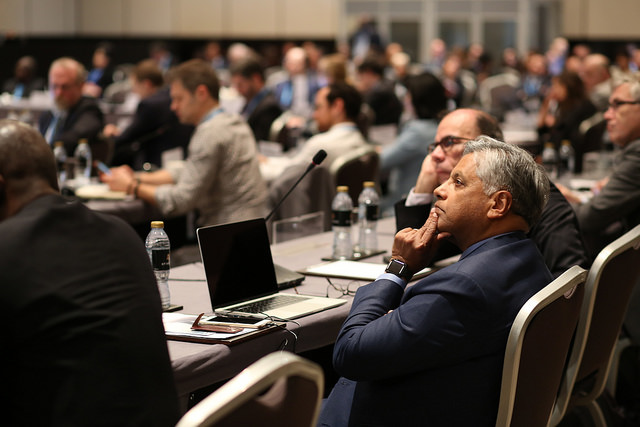
Photos from the Assembly can be found on Flickr.
Kicking-off the year, IRENA held its 8th Assembly — the supreme decision-making making body of the Agency — during which over 1,100 government representatives from 150 countries gathered to provide strategic guidance to IRENA’s work and position it to play a key role in driving the global energy transformation.
A day before the Assembly’s opening, the 2018 Legislators Forum sought to facilitate dialogue between lawmakers from different countries on the deployment of renewables and the critical challenges facing the global energy transformation. A live-blog for the day, showcased the day’s other events, including a public-private dialogue.
During the Assembly, two ministerial roundtable discussions explored the links between an increasingly electrified transport sector and accelerated renewable energy deployment, and the policy instruments and financial mechanisms needed to drive renewable energy investment. A side-event highlighted the IRENA tools and platforms for aiding energy transition in small island states, while newly released reports revealed that all renewable technologies will be cost-competitive by 2020 and where renewable investments are coming from.
The IRENA/ADFD Project Facility announced that solar PV projects in Mauritius and Rwanda had been selected to receive concessional loans worth USD 25 million, and IRENA released an advance summary for policymakers showing that the EU’s renewable energy share could cost-effectively be doubled by 2030 with today’s technologies.
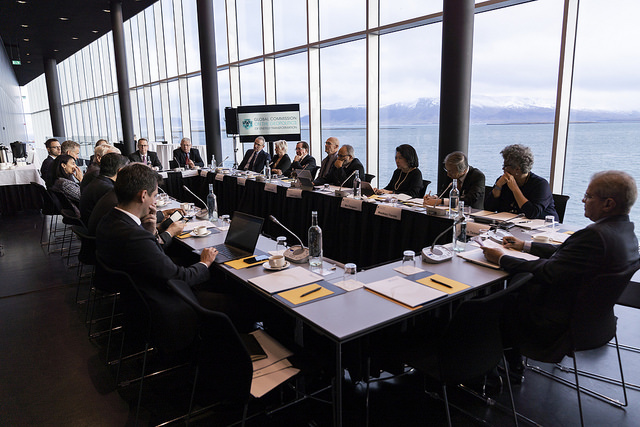
The Global Commission on the Geopolitics of Energy Transformation met four times in 2018. See photos from their third meeting in Iceland on Flickr.
Unique to the 8th Assembly was the creation of a new Global Commission on the Geopolitics of Energy Transformation, tasked with examining the immediate and longer-term geopolitical implications of global energy transformation. The Commission will share its results in January 2019, during the 9th IRENA Assembly. Teaming up with renowned sound artist Bill Fontana, local universities, and Emirati artists, IRENA organised a week-long multimedia art exhibit, Visions of Sustainability, showcasing the works inspired by renewable energy and sustainability.
Following the Assembly, IRENA’s participation at the World Future Energy Summit, included the release of a policy brief co-authored with World Resources Institute that showed an energy transformation in India, led by wind and solar power, could drastically reduce water withdrawal and consumption and carbon emissions.
February
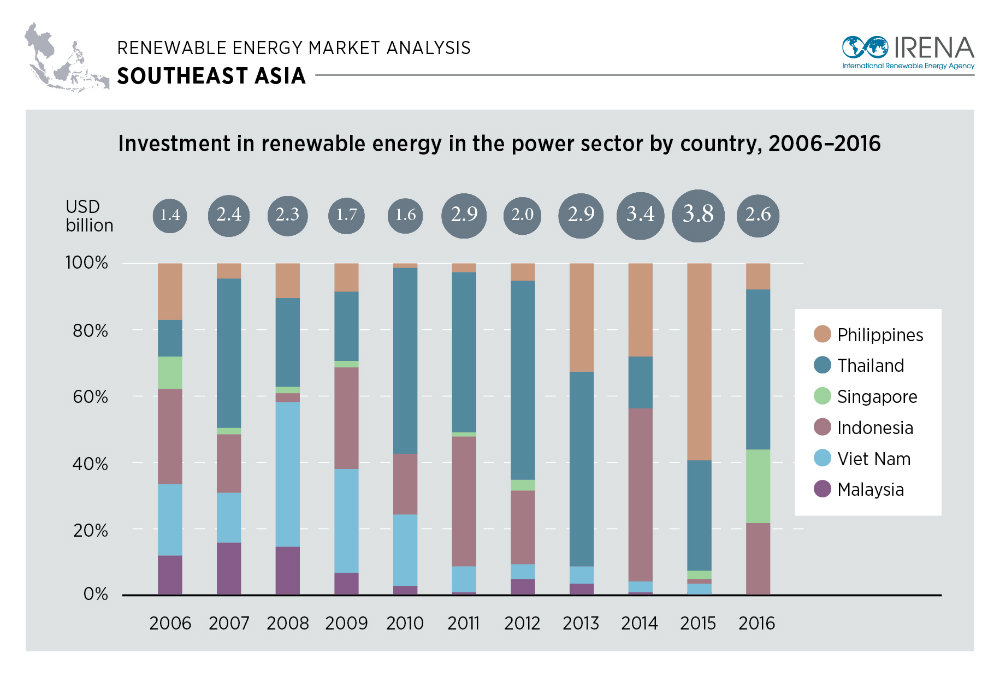
Investment in renewable energy in Southeast Asia's power sector by country.
In February, IRENA showed through its market analysis that higher shares of renewable energy is central to sustainable development across Southeast Asia, noting that up to 2.2 million people could be employed in the sector by 2030, should renewables scale-up in line with the region’s potential.
Early in the month, IRENA Director-General, Adnan Z. Amin travelled to Havana to open the Cuba Sustainable Energy Forum, and welcomed Brazil’s decision to initiate the process of becoming an IRENA Member — highlighting that IRENA’s global and inclusive platform will support the country’s efforts to achieve a sustainable energy future.
Expanding upon January’s summary for policymakers, IRENA released its full Renewable Energy Prospects for the European Union report. Launched in Brussels, the report was welcomed by European Commissioner Miguel Arias Cañete and outlines how a 34% renewables share would result in savings of between EUR 44 billion and EUR 113 billion per year by 2030. With the support of IRENA’s assessment, the European Union adopted a new clean energy package in June with an ambitious target of 32% renewable energy share in total final energy consumption by 2030.
March
During March’s 138th Assembly of the Inter-Parliamentarian Union, Belgian and Vietnamese parliamentarians Andries Gryffroy and Duong Quoc Anh, in consultation with IRENA, floored a resolution on ‘Engaging the private sector in implementing the SDGs, especially on renewable energy’, which was adopted. The resolution specifically encourages Parliamentarians to work with IRENA on exchanging best practice, expertise and renewable energy knowledge.
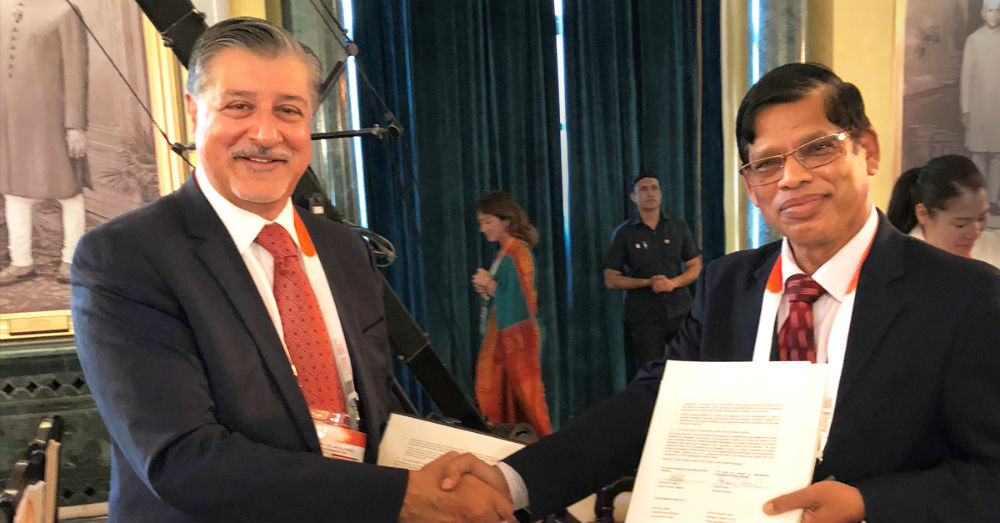
IRENA Director-General Adnan Z. Amin and ISA Director General Upendra Tripathy signed a Joint Declaration to deepen the cooperation between the two organisations.
IRENA welcomed the establishment of the International Solar Alliance, and signed a cooperation agreement with the People’s Government of Hebei Province, China to provide the city of Zhangjiakou with a renewable energy roadmap that will help it deliver a low-carbon Winter Olympics in 2022.
Reports released during the month showed that 115 million people worldwide currently rely on the basic energy services provided by solar lights, globally renewable energy generation capacity grew 8.3% in 2017 with a record addition of 167 gigawatts, and offered insight to countries developing sustainable forest bioenergy using Finnish case studies.
April
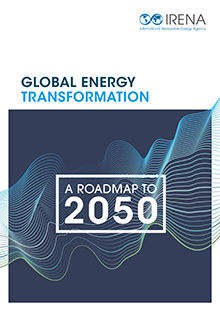
The report's executive summary is available in English, Arabic (عربي), Chinese (中文), French (Français), Russian (Русский), and Spanish (Español).
Teaming up with the World Bank and International Geothermal Alliance, IRENA piloted a new geothermal resource data gathering and classification system on the Indonesian island of Flores. At the Berlin Energy Transition Dialogue, IRENA released Global Energy Transformation: A Roadmap to 2050, showing that a six-fold increase in renewable energy adoption is required to meet the Paris Agreement. In an unprecedented collaboration, IRENA with the International Energy Agency (IEA) and REN21 released a report providing a comprehensive understanding of the policy options to support an accelerated development of renewables.
Invited to Japan by the country’s Minister for Foreign Affairs H.E. Taro Kono, Director-General Adnan Z. Amin visited Japanese renewable energy sites and institutes and discussed Japan’s place within a global energy sector undergoing a rapid transformation.
The Global Commission on the Geopolitics of Energy Transformation released the full list of its commission members, and IRENA revealed a study on renewable energy auctions in sub-Saharan Africa using case studies from Uganda, South Africa and Zambia. An IRENA Renewables Readiness Assessment for Pakistan showed the country’s abundant renewable resources can boost power generation and energy access.
May
At the Sustainable Energy for All Forum in Lisbon, IRENA, the IEA, United Nations Statistics Division, World Bank, and World Health Organization, showed in Tracking SDG7: The Energy Progress Report, that the world is not on track to meet the global energy targets for 2030 set as part of the Sustainable Development Goals.
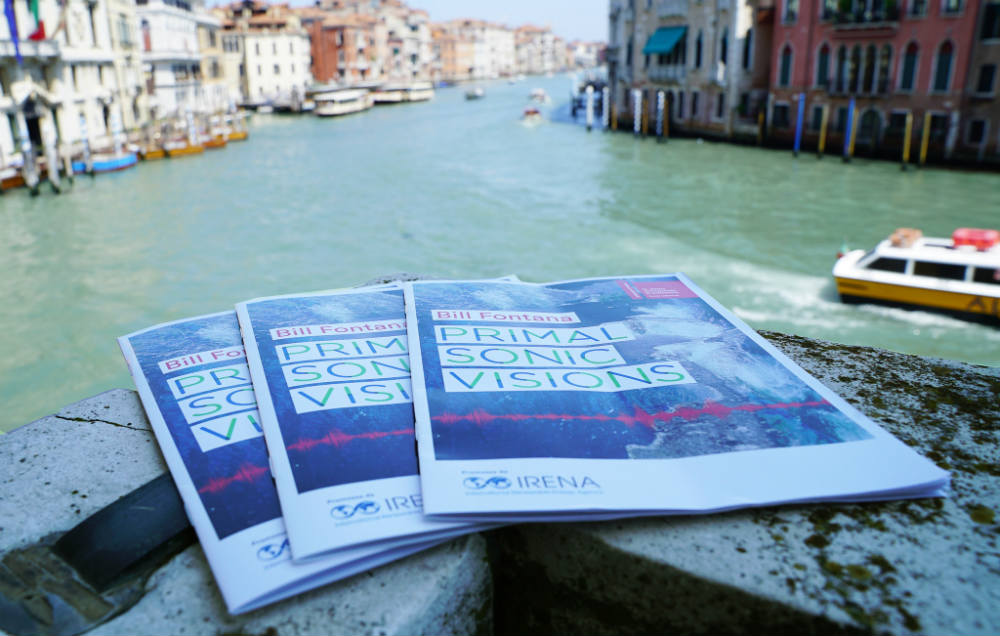
Photos from Primal Sonic Visions' opening in Venice can be found on Flickr.
IRENA held its 15th Council and released the latest renewable energy jobs numbers, showing that globally, over 10 million people are now employed in the renewable energy sector. Revealing the full collection of multimedia works Bill Fontana produced with IRENA, an exhibit, Primal Sonic Visions, ran for three months at the Venice Architecture Biennale.
During the Clean Energy Ministerial held in Copenhagen and Malmӧ, IRENA and Mission Innovation agreed to work together to scale-up the deployment of renewable energy technologies through knowledge sharing, and Canada confirmed its intention to join IRENA — the country’s application has developed since and Canada is expected to become a Member in January 2019.
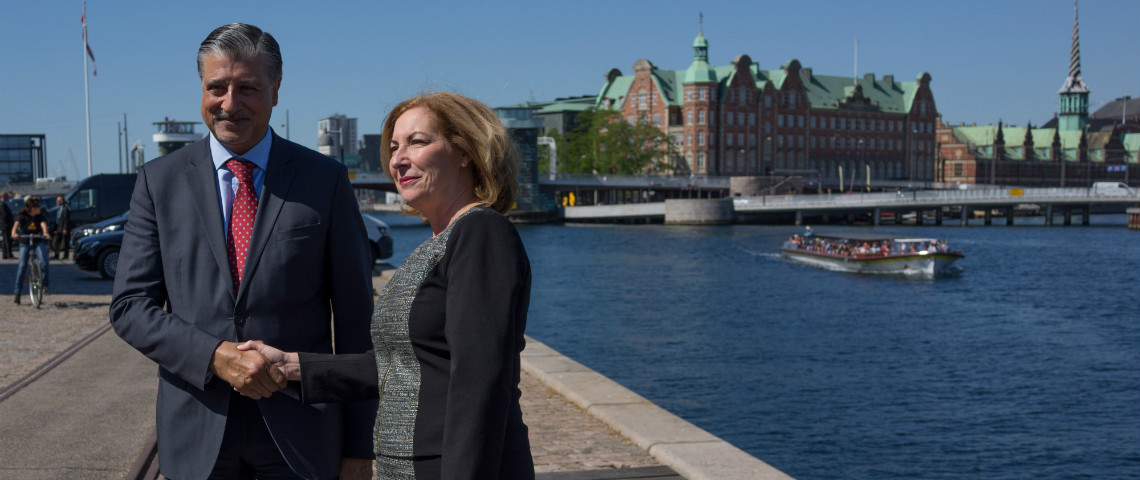
Parliamentary Secretary to Canada's Minister of Natural Resources, Kim Rudd announced in Copenhagen her country's intention to become an IRENA Member.
IRENA’s study on corporate sourcing of renewable energy showed that companies in 75 countries actively sourced 465 terawatt hours of renewable energy in 2017, an amount close to the overall electricity demand of France. A report launched at the Third Mission Innovation Ministerial, Innovation Priorities to Transform the Energy System, provided a high-level overview of the key action areas that can increase the speed of innovation in support of a global shift towards a renewables-powered energy system.
May also saw the release of two offshore wind power reports, outlining the development of standards and best practices that new markets should adopt, and examining the kinds of jobs that can be created with offshore wind.
Finally, in Panama a Clean Energy Corridor of Central America regional consultative event co-organised by IRENA, the Central American Integration System (SICA) and the Economic Commission for Latin America and the Caribbean (ECLAC), offered attendees an opportunity to chart the initiative’s progress and agree on the path forward, and a Renewables Readiness Assessment showed how the Panama’s 70% renewables by 2050 target is achievable.
June
In June, IRENA took part in EU Sustainable Energy Week and welcomed the European Union’s decision to increase its renewable energy target from 27% to 32% by 2030, highlighting that the move reflects the new economics of renewable energy.
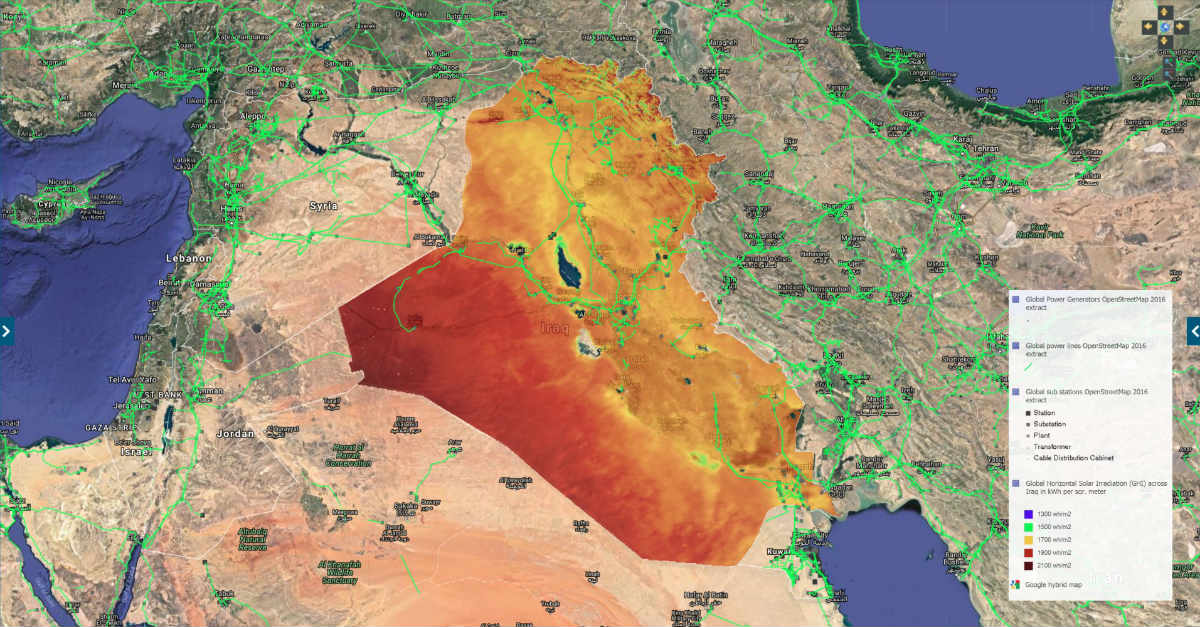
IRENA’s Global Atlas includes over 2,000 renewable energy maps, covering solar, wind, bioenergy, geothermal and marine energy all over the world.
To help project developers measure the relative economic suitability of a range of energy storage applications, IRENA developed and released its electricity storage cost-of-service tool. Using insights from South Africa and the USA, IRENA’s power system regulators planning report identified useful regulatory practices for the era of rapidly improving renewable energy technologies.
Collaborating with the United Nations Development Programme and the Regional Centre for Renewable Energy and Energy Efficiency, IRENA began integrating new solar map data of Iraq into the Agency’s Global Atlas for Renewable Energy web platform — helping support the country’s objective to develop 2.2 gigawatts of renewable energy capacity by 2020.
July

Photos from the High-Level Political Forum can be found on Flickr.
In July, IRENA took part in the UN’s High-Level Political Forum on Sustainable Development in New York. Championing the power of renewable energy to address almost all of the sustainable development goals, the Agency’s Director-General moderated the forum’s session on the progress made in implementing SDG 7 — the global goal aimed at ensuring access to affordable, reliable, sustainable and modern energy for all.
During a side event co-hosted by IRENA and Norway, the Agency’s released Off-grid Renewable Energy Solutions brief, which builds on IRENA’s statistical analysis to offer a global picture of the sector’s trajectory and impact.
August
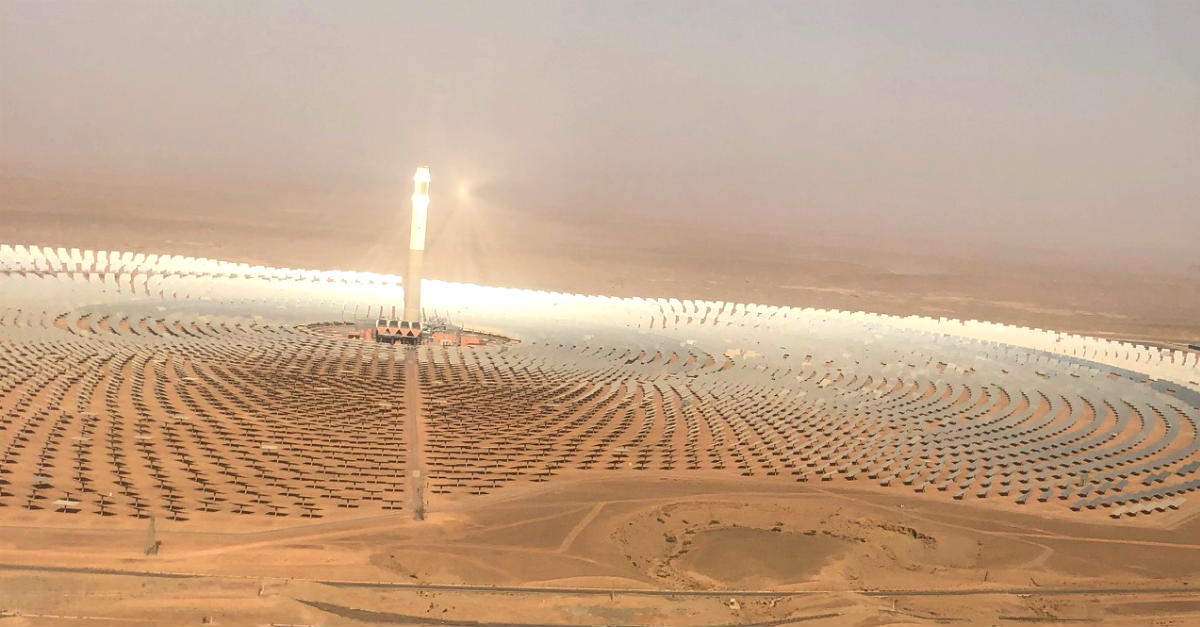
The Nour Solar Complex in Ouarzazate aims to produce 510 megawatts of concentrated solar power in addition to 70 megawatts of solar PV.
In a relatively quiet month, the release of the World Intellectual Property Organisation’s 2018 Global Innovation Index included a chapter authored by IRENA, in which four central policy-level innovation recommendations are outlined as critical to scaling-up renewable energy deployment.
Invited by King Mohammed VI to attend his 19th Throne Day reception, Director-General Adnan Z. Amin visited Morocco and toured the country’s Nour Solar Complex in Ouarzazate – the largest concentrated solar power plant in the world.
September
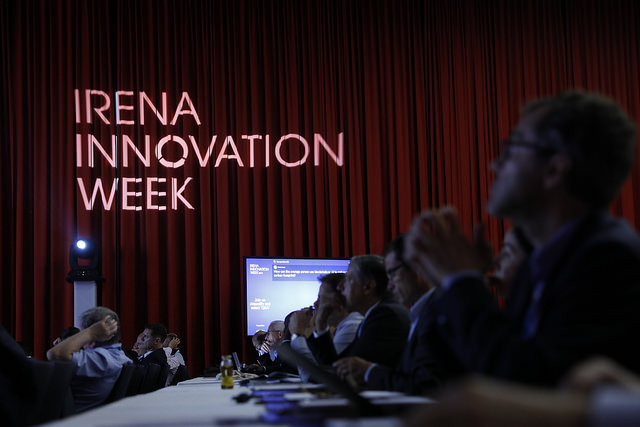
Photos from IRENA Innovation Week 2018 can be found on Flickr.
September was the start of a busy period for IRENA, kicking-off with the IRENA Innovation Week in Bonn. Gathering participants from more than 80 countries to explore the disruptive innovations that are transforming energy systems around the world, IRENA Innovation Week covered topics ranging from blockchain, big data and artificial intelligence, to electric heat pumps and energy sector disruptors. A technology outlook report on hydrogen from renewable power, was released, outlining the potentially pivotal role hydrogen can play in a deeper energy transition.
IRENA was invited to engage with ministers and key stakeholders at the G7 Environment, Oceans and Energy Ministers Meetings, hosted by the Canadian Presidency. Drawing attention to the findings of its Offshore innovation widens renewable energy options brief for policymakers, IRENA underlined to the G7 the potential of offshore renewable energy to meet energy demand, stimulate economic growth and generate employment.
In New York, during the occasion of the United Nations 73rd General Assembly, IRENA brought together heads of state and governments and development partners to strengthen cooperation on renewable energy with the launch of the SIDS Lighthouses Initiative 2.0.
October
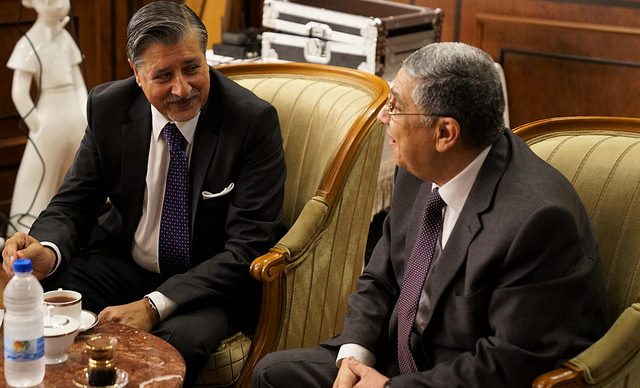
IRENA Director-General Adnan Z. Amin and H.E. Dr Mohamed Shaker, Egyptian Minister of Electricity and Renewable Energy.
Co-organised by IRENA and Egypt’s Ministry of Electricity and Renewable Energy, the Egypt Renewable Conference saw the release of a Renewable Energy Outlook for the country showing that renewables could meet more than 50% of Egypt’s electricity demand and present cost savings of USD 900 million annually. IRENA Director-General Adnan Z. Amin also had the opportunity to meet with Egyptian President Abdel Fattah el-Sisi to discuss the country’s energy future.
Following the release of the IPCC’s Special Report on Global Warming of 1.5°C, IRENA urged the global community to accelerate the deployment of renewable energy, and engaged with parliamentarians at the Inter-Parliamentary Union’s Assembly to increase renewable energy ambition.
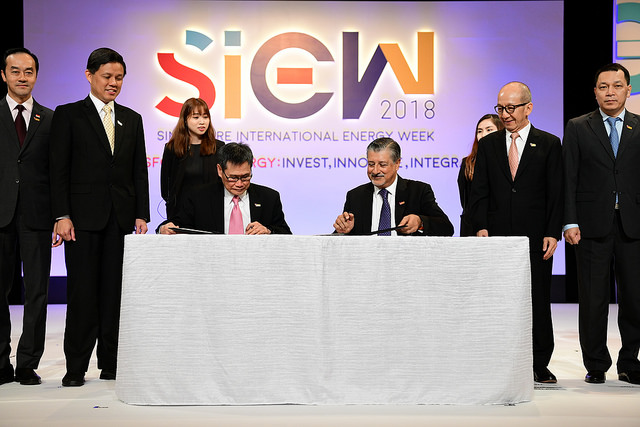
IRENA and ASEAN agreed to work closely to strengthen the enabling environment for renewable energy investment and deployment as ASEAN pursues an aspirational target of 23% of primary energy from renewables by 2025
At the Third International Forum on Energy Transitions in Suzhou, China, IRENA stressed the need to take the global energy transformation to the next level by strengthening innovation, mobilizing investments and modernizing gird infrastructure. In a study conducted by IRENA and the UN Economic and Social Commission of Western Asia, manufacturing potential of renewable energy components in Jordan, Lebanon and the United Arab Emirates was examined. During the month, IRENA began a survey on gender in renewables, with results to be released in January 2019 during the IRENA Assembly.
During the ASEAN Ministers on Energy Meeting, at the start of Singapore International Energy Week, Director-General Adnan Z. Amin outlined that the case for the rapid scale-up of renewable energy across Southeast Asia and signed a memorandum of understanding with ASEAN. IRENA held its biannual International Off-Grid Renewable Energy Conference (IOREC) during the week and released a report on policies and regulations for renewable energy mini-grids.
November
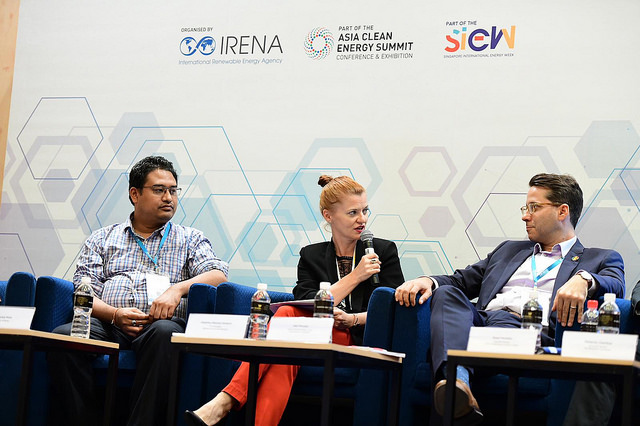
Photos from the international conference on Renewable Energy Solutions for Healthcare Facilities can be found on Flickr.
Back-to-back with IOREC, IRENA held the Agency’s first ever international conference on renewable energy for healthcare, showcasing off-grid renewables’ ability to power remote and rural clinics and hospitals.
IRENA’s 16th Council met to discuss how the Agency can best support its Members to scale-up renewables. The IRENA/ADFD Project Facility announced the opening for applications to its 7th funding cycle — over USD 50 million are available in concessional loans — and IRENA showcased its new Flextool that can assess the flexibility of the power systems.
An IRENA analysis estimated that G20 countries hold 75% of the global renewables deployment potential by 2030, and a report on West Africa outlined three broad scenarios for the growth of renewables in the region’s power systems (available in both English and French).
December
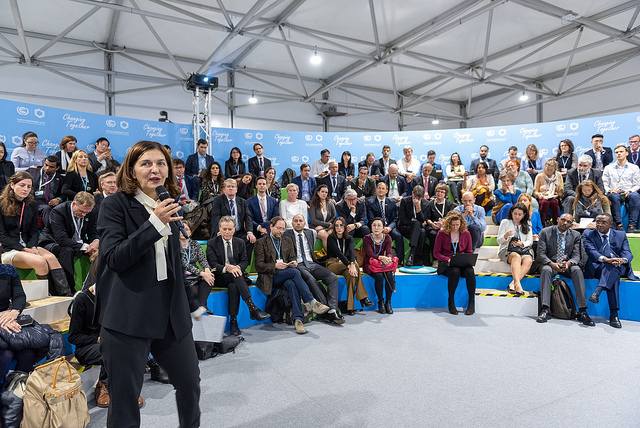
Photos from COP24 in Katowice can be found on Flickr.
In the last month of the year, IRENA took part in the United Nations annual climate conference, COP24, with the Director-General advocating that renewables to provide an opportunity to tackle climate change and create prosperity. COP24’s Energy Day underlined the urgency of taking decisive action to tackle climate change, and IRENA brief updates found that climate-safe energy competes on cost alone and provided an overview of countries’ renewables targets in relation to NDCs. IRENA also launched a new innovative website designed to showcase how renewable energy is key climate solution.
The IRENA Secretariat would like to wish you a happy New Year and festive season, and hope that you stay tuned to our channels for updates on IRENA activities and advancements in the field of renewable energy.
